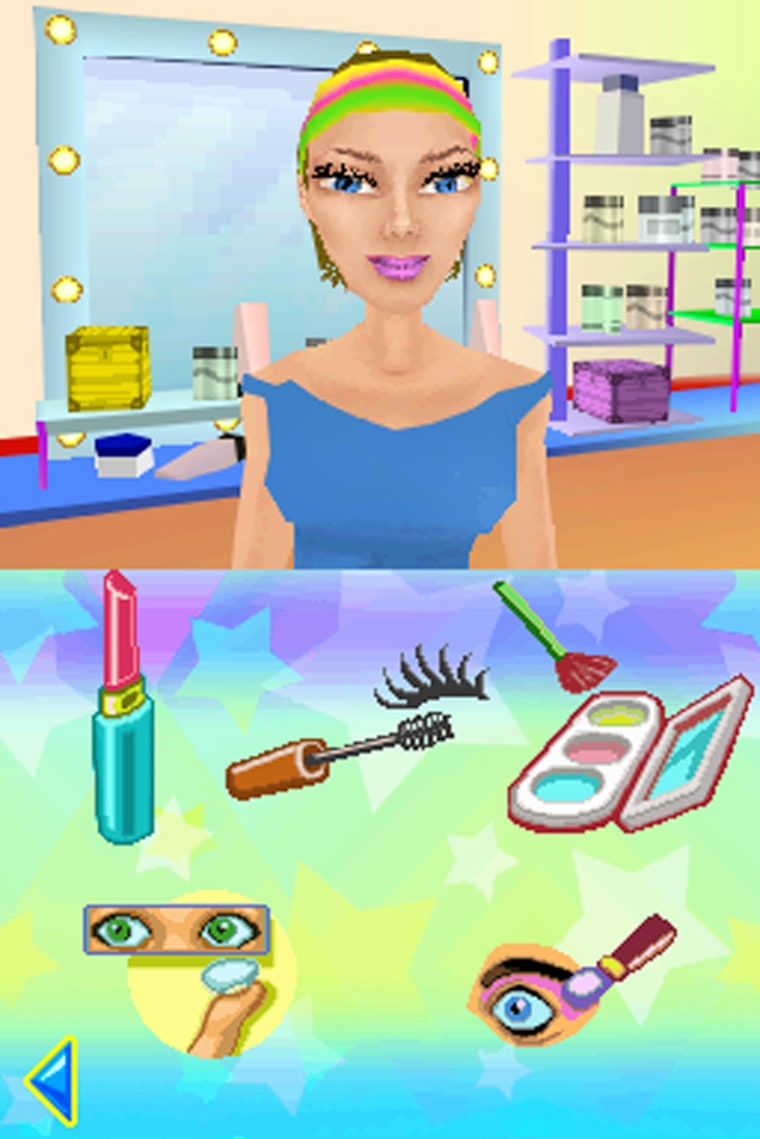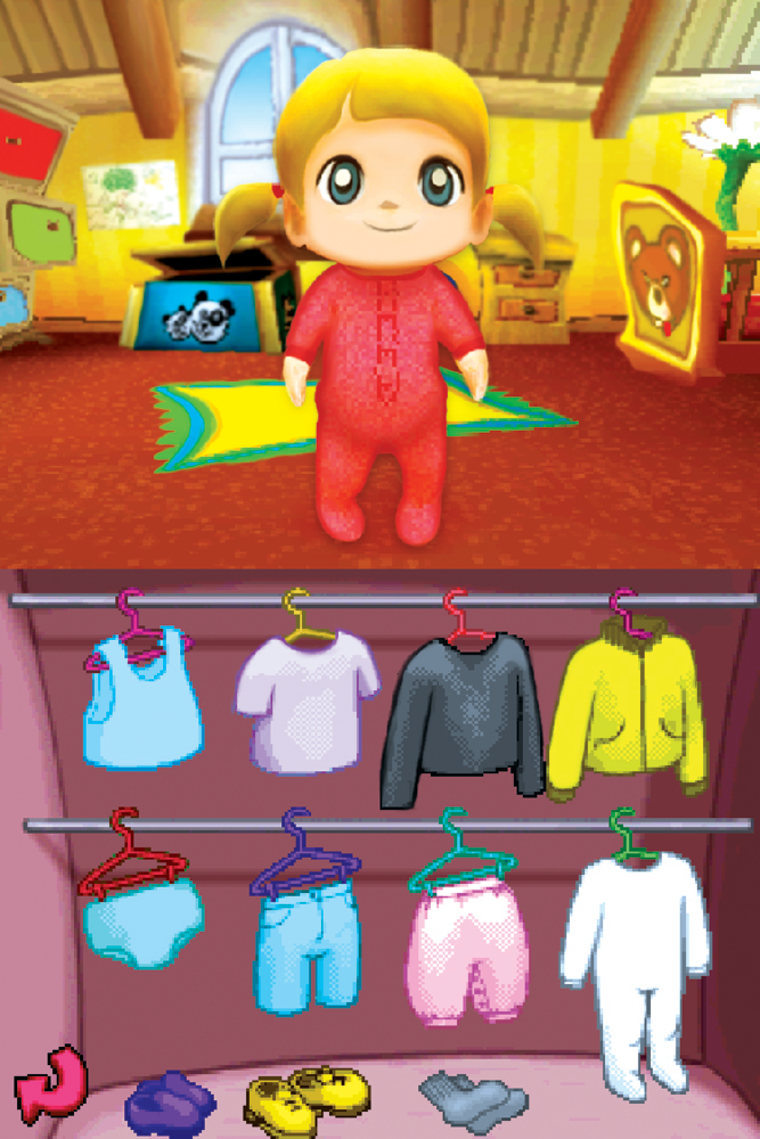Ubisoft made its fortunes selling squad-based shooters like the"Rainbow Six” series and the"Ghost Recon” games. You know, real guy stuff. So what are they doing selling games about clothes, babysitting and ballet?
Making a lot of money, that’s what.
Since launching its Imagine brand in late 2007, Ubisoft has confirmed what it already suspected: There’s gold in girl gamers. The company has put out 15 girl-centered titles since last year — games such as "Fashion Designer," "Movie Star," "Master Chef" and "Babyz." And it’s sold 8 million copies of the games worldwide.
But some experts — and lay people — are concerned that gender-specific games can send the wrong message to young girls. When the games launched, more than a few bloggers took the company to task for seeming to trade on tired old stereotypes.
"I would love to know what else Ubisoft is doing for girls, other than shopping, fashion and pets. Anything?" wrote Alice Taylor on her Wonderland blog. Even Kotaku, a decidedly dude-heavy game site, put up a post with the snarky headline: "Ubisoft puts women in their place."
As a grown-up girl, I admit that my first reaction to the Imagine brand was to be annoyed. (Seriously. "Party Babyz?") But then I started thinking about my own erstwhile childhood. I loved building forts and playing kickball in the cul-de-sac. But I also loved figure skating and ballet. I was crazy about horses. I was the neighborhood babysitter.
Ubisoft wasn’t coming into this market cold — its virtual animal-raising "Petz" games have been super popular with the ‘tween girl set. And the company made decisions on what to put in the Imagine line, says Ubisoft senior vice president Tony Key, based on feedback they got from real-live girls.
"Almost every single game in our lineup is a result of a ranking system that we put in front of these girls, (asking) 'What’s interesting to you?'" he says."The list isn’t just 'Fashion Designer,' 'Babyz' and 'Wedding Designer' … it’s got archaeology on there, it’s got lawyer on there, it’s got teacher on there, it’s got doctor on there. ‘”
To be fair, the sparkle-laden Imagine games do include titles such as "Animal Doctor," "Teacher" and "Interior Designer" — all professions that aren’t so stereotypically female. But the best-selling title, by far, in the Imagine line? "Fashion Designer."
Karen Shanor, a neuropsychologist based in Washington D.C., says it’s limiting — and harmful — to tell little girls that these games are "just for them."
"Girls want this because they’re told to want this, because they think they should, and that’s what their friends are getting. We gender-label things," she says. "I’m a girl so I should enjoy shopping and cooking and getting a manicure and there’s nothing wrong with that. There’s nothing wrong with a guy enjoying that, either."
But Key says that, generally, girls respond differently to different game mechanics than the boys do. Girls want to create, and boys want to destroy.
"These girls love customization, they love the creative aspects of 'Fashion Designer,' and the social aspects of showing your friends what you’ve created. Whereas boys are the opposite — they’re very interested in action,” says Key. "You can’t sell the same game to both of them, as a rule."
Nonsense, says Shanor, also a noted toy expert and author. "Boys want to blow things up because that’s what they’re told their territory is."

Key points to the sales of the games as proof that they’re resonating with young girls. "Stereotypical? That’s kind of like painting a brush against an entire product line that’s actually performing very well and the audience told us (that) they really want," he says. "We’re still largely unchallenged in the girl space."
That’s not entirely true. Disney Interactive (formerly Buena Vista Games) has been making games based off their popular TV shows for five years, starting with the girly Hilary Duff vehicle, "Lizzie Maguire." And Bellevue-Wa.-based Her Interactive has been making its PC-based Nancy Drew games for girls for a decade.
Megan Gaiser, CEO of Her Interactive, says that back in 1999, they sat down with publishers such as Electronic Arts, Hasbro and Activision and were told that girls were computer phobic, and they’d never play video games. But Her Interactive found a way to get their first game "Secrets Can Kill," out to market: They became publishers on Amazon. And sales of the game took off.
"The New York Times dubbed us the 'Un-Barbie of computer games,'" laughs Gaiser. "We were really proud of that."
The success of the Nancy Drew line — 6.6 million copies sold — shows that there’s an appetite for smart, plucky heroines in games. And I wish there were more of them. I don’t have any problem with games about ballet and clothes, but why aren’t there more female adventurers (other than Lara Croft) in video games? Where are the female soldiers? The female athletes? Haven't the good people at EA Sports heard about Title IX?
Females represent 38 percent of gamers, according to the market research company the NPD Group. Ubisoft made a good business decision with its Imagine line, and it’s certainly helped the bottom line. But can’t we do better for our girls? Shouldn’t we want more for them than a game where the objective is to become an A-list movie star? As a soon-to-be parent, I can tell you, resoundingly, yes.
about Ubisoft’s Imagine line of games and games for girls, in general. Selected responses may be published in a subsequent story.
